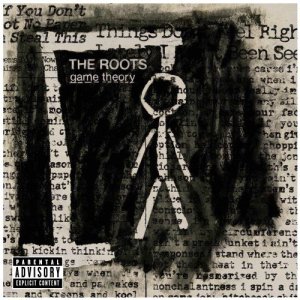 “Game Theory,” released in 2006, is the eighth studio album by American hip-hop band The Roots. Known for their thought-provoking lyrics, live instrumentation, and innovative approach to hip-hop, The Roots deliver an album that is politically charged, socially conscious, and musically brilliant. “Game Theory” delves into the complexities of life in contemporary America, addressing issues such as war, poverty, and systemic oppression with lyrical depth and musical dexterity.
“Game Theory,” released in 2006, is the eighth studio album by American hip-hop band The Roots. Known for their thought-provoking lyrics, live instrumentation, and innovative approach to hip-hop, The Roots deliver an album that is politically charged, socially conscious, and musically brilliant. “Game Theory” delves into the complexities of life in contemporary America, addressing issues such as war, poverty, and systemic oppression with lyrical depth and musical dexterity.
The album opens with the powerful and socially conscious track “False Media.” Black Thought’s poignant lyrics and the band’s tight instrumentation create a sense of urgency and set the tone for the rest of the album. The song’s lyrical content addresses media manipulation and the dissemination of misinformation, showcasing The Roots’ commitment to truth-telling and social commentary.
Continuing with “Game Theory,” the title track, The Roots delve into the political landscape and societal unrest. The song’s haunting production, driven by a hypnotic piano loop and Questlove’s masterful drumming, creates a sense of tension and unease, perfectly complementing Black Thought’s introspective and incisive lyrics.
One of the standout tracks on the album is “Don’t Feel Right.” With its infectious groove, catchy horn samples, and Black Thought’s rapid-fire delivery, the song tackles the disillusionment and disconnect that many feel in the face of social and political issues. The Roots’ ability to blend live instrumentation with intricate wordplay shines through in this powerful and memorable track.
As the album progresses, “Here I Come” delivers a burst of energy and swagger. The song’s infectious rhythm, catchy hooks, and Black Thought’s commanding vocal presence make it a standout moment that showcases The Roots’ ability to create anthemic and empowering hip-hop.
“Long Time” featuring Peedi Peedi and Bunny Sigler showcases The Roots’ ability to collaborate with other artists and create dynamic and musically rich tracks. The song’s soulful samples, intricate verses, and infectious chorus create a memorable and engaging listening experience.
The album’s midpoint introduces “Atonement,” a haunting and introspective instrumental interlude. The track’s atmospheric soundscapes and subtle melodies provide a moment of reflection and contemplation.
“Miraclous” featuring Peedi Peedi and Black Thought showcases The Roots’ lyrical prowess and storytelling ability. The song’s dark and moody production, combined with the intricate wordplay, creates a sense of mystery and depth.
The album’s penultimate track, “Clock with No Hands,” features Mercedes Martinez and showcases The Roots’ ability to infuse their music with soulful melodies and powerful vocal performances. The song’s introspective lyrics and lush instrumentation create a captivating and introspective moment on the album.
The album closes with “Can’t Stop This,” a politically charged and socially conscious track. The song’s intense energy, powerful lyrics, and driving rhythm leave a lasting impact, serving as a fitting conclusion to an album that fearlessly tackles the challenges and injustices of contemporary society.
In conclusion, “Game Theory” is a powerful and socially conscious album that showcases The Roots’ musical brilliance and lyrical depth. With its thought-provoking lyrics, live instrumentation, and innovative production, the album stands as a testament to the band’s artistic integrity and commitment to addressing pressing societal issues. “Game Theory” remains a defining record in The Roots’ discography, continuing to resonate with listeners who seek music that challenges and inspires.
This post has already been read 339 times!

























